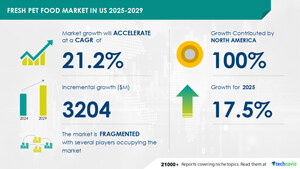NEW YORK, Jan. 9, 2025 /PRNewswire/ -- Report on how AI is driving market transformation - The artificial plants and flowers market in us size is estimated to grow by USD 380.7 million from 2025-2029, according to Technavio. The market is estimated to grow at a CAGR of almost 3.4% during the forecast period. Growing use of artificial plants and flowers for decorative and aesthetic purposes is driving market growth, with a trend towards increased fashion of interior designing. However, volatility in raw material prices used for manufacturing artificial plants and flowers poses a challenge. Key market players include Balsam Brands Inc., Becks Silk Plant Co., Chans Silk Flowers Inc., Charles Lubin Co. Inc., Dongyi Artificial Plants Co. Ltd., H and P Sales Inc., Inter IKEA Holding BV, International Greenscapes LLC, J.S. Flower Co., Jamali Floral and Garden Supplies, M and S Schmalberg Inc., Natural Decorations Inc., Nearly Natural, New Growth Designs, Pacific Silk Plants, Petals, Plantscape Commercial Silk, Prestige Botanicals, SilkPlantsDirect, and Silks Are Forever.
AI-Powered Market Evolution Insights. Our comprehensive market report ready with the latest trends, growth opportunities, and strategic analysis- View Free Sample Report PDF
Forecast period |
2025-2029 |
Base Year |
2024 |
Historic Data |
2019 - 2022 |
Segment Covered |
Material (Polyester, Plastic, Clay, and Others), End-user (Commercial and Residential), Distribution Channel (Offline and Online), and Geography (North America) |
Region Covered |
US |
Key companies profiled |
Balsam Brands Inc., Becks Silk Plant Co., Chans Silk Flowers Inc., Charles Lubin Co. Inc., Dongyi Artificial Plants Co. Ltd., H and P Sales Inc., Inter IKEA Holding BV, International Greenscapes LLC, J.S. Flower Co., Jamali Floral and Garden Supplies, M and S Schmalberg Inc., Natural Decorations Inc., Nearly Natural, New Growth Designs, Pacific Silk Plants, Petals, Plantscape Commercial Silk, Prestige Botanicals, SilkPlantsDirect, and Silks Are Forever |
Key Market Trends Fueling Growth
The US economy's growth over the last decade has led to an increase in consumer spending, particularly on home improvement and decor products like artificial plants and flowers. This trend is influenced by the rise in contemporary interior design styles and the influence of media and regional arts. The growing number of working women in the US, now accounting for approximately 46.4% of the labor force, is driving the interior design trend further. Additionally, the increasing number of independent bloggers and designers collaborating with e-commerce platforms is making cost-effective interior design ideas more accessible, fueling the growth of the artificial plants and flowers market in the US.
The Artificial Plants and Flowers market in the US is thriving, with trends leaning towards colorful pots and natural stones for a more authentic look. Premium artificial flowers, such as those used in bridal jewelry like necklaces, brooches, and earrings, continue to be popular among celebrities. Fire safety is a concern, with flammable materials like paper, clay, plastic, polyester, and silk being phased out in favor of safer alternatives. The market caters to various sectors, including ceremonies, gifting during festive seasons, and decorative elements for residential, commercial, industrial, and theme parks. Faux plants made of medium-density fiberboard, paper, clay, plastic, and silk offer an aesthetic appeal for gardening goods and cater to gardeners and commercial spaces. Online shopping and E-retail have made gifting artificial flowers more convenient.
Insights on how AI is driving innovation, efficiency, and market growth- Request Sample!
Market Challenges
- The artificial plants and flowers market in the US experiences moderate price volatility due to the cost fluctuations of key raw materials. These materials include plastic, polyester, cotton, glass, and silk. Notably, polyester, a common raw material, is particularly susceptible to price instability. The price volatility of polyester significantly impacts manufacturers' profit margins. Plastic products used in manufacturing artificial plants and flowers are derived from crude oil products. As such, fluctuations in crude oil prices can negatively influence the cost of plastic raw materials. In recent years, declining crude oil prices have led to cost-cutting measures in the oil and gas industry, including workforce reductions and rig idling. The US Energy Information Administration reports that the price of Brent crude oil dropped from USD93.17 per barrel in 2014 to USD48.66 a barrel in 2015, causing a 47.5% decrease. In 2018, the average crude oil import cost rose to USD66.17 per barrel. However, in 2020, crude oil prices plummeted due to the COVID-19 outbreak, with the International Energy Agency reporting a 40% decrease in March 2020 compared to the previous year. These crude oil price fluctuations adversely impact the prices of raw materials like polyesters and plastics, potentially hindering the growth of the artificial plants and flowers market in the US.
- The Artificial Plants and Flowers market in the US is thriving, with occasions and events driving demand for synthetic alternatives. Uniform beauty and smart features, such as sensors and lighting, are key selling points. Recycled materials and discounts are also important factors. Artificial greenery is popular for beautification, especially for weddings, festivals, and fashion shows. E-commerce platforms and physical stores cater to fashion-conscious individuals seeking realistic, non-toxic, and allergy-friendly options. Polyester manufacturing from purified terephthalic acid, molding and dyeing, shapes, colors, and textures create a wide range of artificial plants and flowers. Nylon and other materials offer long-lasting solutions for indoor decoration, weeding cars, and decorative articles. Aroma and fragrance are added benefits for some products, while hospitals and educational institutions use artificial plants for their beauty and low maintenance.
Insights into how AI is reshaping industries and driving growth- Download a Sample Report
Segment Overview
This artificial plants and flowers market in US report extensively covers market segmentation by
- Material
- 1.1 Polyester
- 1.2 Plastic
- 1.3 Clay
- 1.4 Others
- End-user
- 2.1 Commercial
- 2.2 Residential
- Distribution Channel
- 3.1 Offline
- 3.2 Online
- Geography
- 4.1 North America
1.1 Polyester- The artificial plants and flowers market in the US is experiencing significant growth, driven in part by the increasing demand for decorative items. Since the 1970s, polyester has been the primary material used to create these artificial products due to its affordability and desirable properties. Polyester is a type of polymer with an ester functional group in each repeat unit of its main chain. This material's resistance to fading and its ability to absorb adhesives and colors make it the preferred choice for manufacturers. Consequently, the polyester segment is expected to fuel the growth of the artificial plants and flowers market in the US during the forecast period.
Download complimentary Sample Report to gain insights into AI's impact on market dynamics, emerging trends, and future opportunities- including forecast (2025-2029) and historic data (2019 - 2022)
Research Analysis
The Artificial Plants and Flowers market in the US has witnessed significant growth due to the increasing demand for aesthetically pleasing decorative articles. Faux plants made of materials like paper, clay, plastic, polyester, and silk are gaining popularity for their realistic appearance and low maintenance. These decorative articles are not only used for gardening goods but also for indoor decoration, events, and occasions, including public gatherings. E-commerce platforms have made it easier for consumers to purchase these decorative pieces online. Artificial flowers and plants are also used for weeding cars and as decorative jewelry. Allergies to real flowers and the high cost of maintaining them have led to the increased use of non-toxic, colorful pots filled with artificial flowers made of natural stones. Hospitals, educational institutions, and even as gift articles, artificial plants and flowers are becoming a preferred choice due to their long-lasting nature and realistic look.
Market Research Overview
The Artificial Plants and Flowers market in the US has seen significant growth in recent years, with an increasing preference for faux plants and flowers due to their aesthetic appeal and uniform beauty. These synthetic alternatives are gaining popularity among gardening goods retailers, gardeners, and commercial spaces, as well as in households for indoor decoration and gifting occasions. Faux flowers come in various materials such as paper, clay, plastic, polyester, silk, and even recycled materials, offering realistic appearances and smart features like sensors and lighting. Online shopping platforms and e-commerce have made it easier for consumers to purchase these decorative articles, with discounts and promotions often available. Artificial greenery is used for beautification at various events, including weddings, festivals, fashion shows, and public gatherings. Faux flowers are also used for self-expression and artistry by fashion-conscious individuals and are available in a wide range of shapes, colors, textures, and sizes. Nylon, purified terephthalic acid, molding, and dyeing are essential in the manufacturing process. These decorative articles are used for various purposes, including indoor decoration, weeding cars, and as decorative elements for events and occasions. Allergies, aroma, and fragrance are also considered in the production of artificial flowers, with non-toxic options available. Artificial flowers are used in various settings, from premium ceremonies for brides and celebrities to hospitals and educational institutions as gift articles. However, safety concerns such as fire risk and flammability must be addressed. Overall, the Artificial Plants and Flowers market in the US is a growing industry that caters to various sectors and offers a wide range of products for different purposes and occasions.
Table of Contents:
1 Executive Summary
2 Market Landscape
3 Market Sizing
4 Historic Market Size
5 Five Forces Analysis
6 Market Segmentation
- Material
- Polyester
- Plastic
- Clay
- Others
- End-user
- Commercial
- Residential
- Distribution Channel
- Offline
- Online
- Geography
- North America
7 Customer Landscape
8 Geographic Landscape
9 Drivers, Challenges, and Trends
10 Company Landscape
11 Company Analysis
12 Appendix
About Technavio
Technavio is a leading global technology research and advisory company. Their research and analysis focuses on emerging market trends and provides actionable insights to help businesses identify market opportunities and develop effective strategies to optimize their market positions.
With over 500 specialized analysts, Technavio's report library consists of more than 17,000 reports and counting, covering 800 technologies, spanning across 50 countries. Their client base consists of enterprises of all sizes, including more than 100 Fortune 500 companies. This growing client base relies on Technavio's comprehensive coverage, extensive research, and actionable market insights to identify opportunities in existing and potential markets and assess their competitive positions within changing market scenarios.
Contacts
Technavio Research
Jesse Maida
Media & Marketing Executive
US: +1 844 364 1100
UK: +44 203 893 3200
Email: [email protected]
Website: www.technavio.com/
SOURCE Technavio

WANT YOUR COMPANY'S NEWS FEATURED ON PRNEWSWIRE.COM?
Newsrooms &
Influencers
Digital Media
Outlets
Journalists
Opted In




Share this article